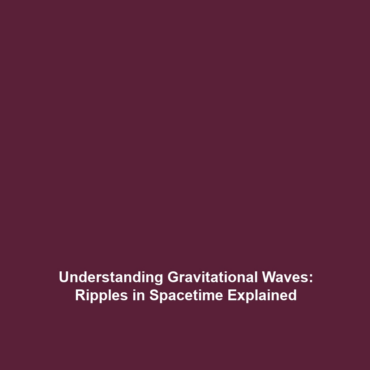What are Gravitational Waves?: A Description of Gravitational Waves as Ripples in Spacetime
Introduction
Gravitational waves are fascinating phenomena that emerge from the dynamic behavior of massive celestial bodies. As ripples in spacetime, these waves carry critical information about cosmic events, such as merging black holes and neutron stars. The study of gravitational waves not only deepens our understanding of the universe but also opens new avenues in astrophysics and cosmology. Understanding gravitational waves is essential in grasping the fundamental nature of gravity itself, thereby highlighting their profound significance within the broader context of modern physics.
Key Concepts
To understand what gravitational waves are, one must explore several key concepts related to this remarkable phenomenon.
The Nature of Spacetime
Spacetime, conceived by Albert Einstein’s theory of general relativity, is a four-dimensional framework that combines the three dimensions of space with the dimension of time. Massive objects, like stars and planets, warp the structure of spacetime, creating gravitational effects that we experience as gravity.
Generation of Gravitational Waves
Gravitational waves are generated by the acceleration of massive bodies, particularly during catastrophic events such as the collision of two black holes. These waves propagate at the speed of light, carrying information about their origins and the dynamics involved.
Applications and Real-World Uses
The study of gravitational waves has led to groundbreaking applications in both astrophysics and technology. Here are some significant real-world uses:
- Astrophysical Discovery: Gravitational wave astronomy allows scientists to detect and analyze cosmic events that were previously unobservable.
- Testing General Relativity: Observational data from gravitational waves provides a platform for testing Einstein’s theories on gravitation.
- Predicting Cosmic Events: By studying the characteristics of gravitational waves, researchers can anticipate future astronomical phenomena.
Current Challenges
Despite their significance, several challenges and limitations hinder the study of gravitational waves:
- Detection Sensitivity: Current detectors, such as LIGO and Virgo, have limitations in sensitivity, particularly for distant events.
- Data Analysis Complexity: The data acquired from gravitational wave events requires sophisticated analysis techniques to extract meaningful information.
- Funding and Resources: Continued research and advancement of technology depend heavily on funding, which can fluctuate.
Future Research and Innovations
The future of gravitational wave research is promising, with several innovations on the horizon:
- Next-Generation Detectors: Upcoming projects like the Einstein Telescope and LISA (Laser Interferometer Space Antenna) aim to enhance sensitivity and extend detection capabilities.
- Multimessenger Astronomy: Integrating gravitational wave observations with electromagnetic and neutrino data could provide a holistic view of cosmic events.
- Improved Data Modeling: Advances in machine learning and computational modeling will streamline data analysis processes, increasing the efficiency of gravitational wave studies.
Conclusion
Gravitational waves are not merely ripples in spacetime; they represent a revolutionary way to observe and understand the universe. The implications of studying these waves extend far beyond astronomy, challenging our existing theories and paving the way for future discoveries. As research progresses, a deeper understanding of gravitational waves will undoubtedly enrich our knowledge of the cosmos. To learn more about gravitational waves and their potential applications in astronomy, consider exploring additional topics such as astrophysical discoveries and testing general relativity.


